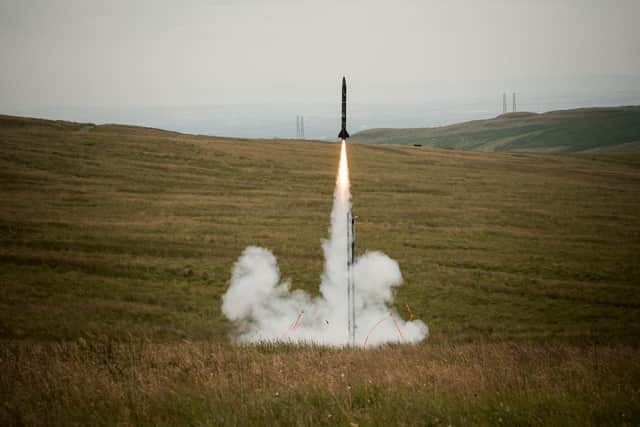Rocket fired from Ayrshire moor in a bid to make space more green
Spectators gathered at the Scottish Aeronautics and Rocketry Association's base at Fairlie Moor, just south of Largs, Ayrshire, for the launch of the rocket Nebula, built by a team from Imperial College London.
The launch was put back several hours as final checks were made on the rocket, which has been designed to cut down on “space junk” and be re-used following a space-bound voyage.
Advertisement
Hide AdAdvertisement
Hide AdThe test flight, which was set to take the rocket to 16,000 feet, took place in preparation for its ultimate journey beyond the Karman Line – the internationally recognised boundary to space which sits at roughly 100km above sea level.
If successful, the Imperial team will be the first student group to pass the space boundary with a reusable rocket.
Aeronautical Engineering student Shapol M, Shakil Perera, Tian Fang and Mohammad Kapadia designed the rocket after setting up their Karman Space Programme last year.
Shapol said: "This diverse, ambitious and unique group of students are making space more accessible and sustainable, and want to show what is possible for the future.”


The rocket was launched just before 7pm after delays to the original launch time pushed back permission from air traffic control teams at Prestwick Airport.
The team will build and launch a series of prototypes over the next two years, aiming at different altitudes and helping them refine their design before building up to the space launch in 2024.
At Fairlie, the recovery and avionics systems of the nine-metre high rocket were tested with the team successfully (??) concluding the rocket was reusable.
Helen Sharman, Britain’s first astronaut and UK Outreach Ambassador at Imperial said: “A huge factor in making rockets eco-friendly is the manufacture of the rocket itself.
Advertisement
Hide AdAdvertisement
Hide Ad“With a reusable design, the Karman Space Programme students are stretching rocket technology to deliver positive benefits to our lives with minimal negative impact on the Earth, making this a really worthwhile student project.”
Following the test flight, a full-size replica of the rocket, the largest student-built rocket in the UK, will be displayed shortly in the College’s main entrance, before moving to the Science Museum in December.
The final rocket and their early prototypes will be researched and designed by the team, with most elements being built at the College’s White City Campus.
Some elements, including the rocket’s liquid engine, will be manufactured by British aerospace manufacturing company GKN. One of the project’s sponsors, Dassault Systèmes, has supported the team to simulate their designs.
The Scottish Aeronautics and Rocketry Association site at Fairlie Moore is the United Kingdom Rocketry Association (UKRA) affiliated club for model, high-power, and amateur rocketry north of the Border.
The moor is given over to amateur space enthusiasts for the firing of scratch-built and kit-built rocket vehicles, as well as rocket-boosted gliders.
SARA will host the annual International Rocket Week in August, with the event inviting rocketeers from around the world for a weekend of building, flying and competition.
Comments
Want to join the conversation? Please or to comment on this article.
